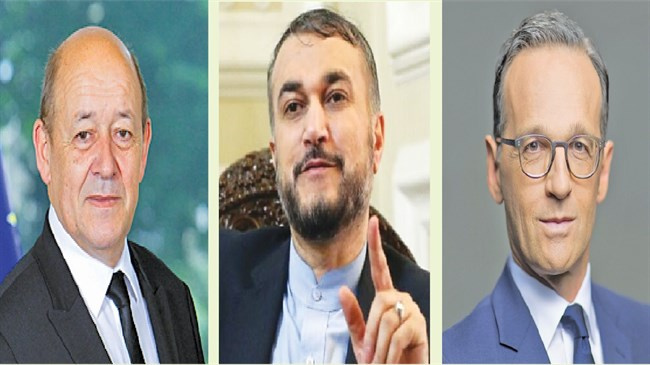FM: Iran seeking ‘good agreement’ in Vienna talks

Iran’s foreign minister said Tehran is seeking a “good agreement” on the revival of the 2015 nuclear deal, which would, in turn, lead to the removal of Washington’s unilateral sanctions.
Hossein Amir-Abdollahian made the remarks in a Tuesday phone conversation with his French counterpart, Jean-Yves Le Drian, according to Press TV.
He slammed Washington for creating the current problems regarding the nuclear deal, also known as the Joint Comprehensive Plan of Action (JCPOA), between the Islamic Republic and P5+1, the UN Security Council’s five permanent members – the U.S., Russia, China, Britain, France – plus Germany.
Amir-Abdollahian added a good agreement has certain requirements, including a return by all sides to their commitments and the removal of the sanctions.
In May 2018, under former president Donald Trump, the United States pulled out of the JCPOA and reimposed Washington’s unilateral sanctions on Iran in a bid to cripple the country’s economy and bring the Islamic Republic to the negotiating table to hammer out a new nuclear deal, a plot which was foiled thanks to the Iranians’ resistance.
In April, a diplomatic process started in the Austrian capital of Vienna to restore the JCPOA and weigh the possibility of the U.S. returning to the deal. Six rounds of talks within this framework have so far been held between Iran and the remaining signatories to the agreement, namely China, Russia, France, the UK and Germany, with the seventh expected to begin on November 29.
Negotiations on the JCPOA revival started by the other parties after they were faced with Iran’s reversible retaliatory measures, as per Paragraph 36 of the JCPOA granting a party the right to suspend its contractual commitments in case of noncompliance by other signatories, involving a phased reduction of nuclear commitments under the accord, in the face of their inaction toward the U.S. and failure to safeguard Tehran’s interests within the framework of the deal despite their promises following a year of strategic patience by the Islamic Republic.
Amir-Abdollahian called Iran’s defense program an inalienable right of the country, adding that regardless of the nonconstructive, sanctions-oriented U.S. behavior, “we will continue to increase our country’s defense power mightily”.
Tehran has time and again clarified its position on reviving the JCPOA, insisting that the U.S. needs to guarantee that it will not abandon the deal again under another administration.
On Monday, Foreign Ministry spokesman Saeed Khatibzadeh once again spelled out what the U.S. must do to regain its JCPOA membership.
The U.S. must agree to return from the path it took as the party to blame for the current situation, he told reporters at a press briefing.
Khatibzadeh explained that the U.S. then needs to remove all the cruel and illegal sanctions it imposed on Iran after its unilateral withdrawal from the nuclear deal “in one go and in an effective way”.
Then Washington has to guarantee that “no administration in the United States would belittle the world and international law” again by repeating the withdrawal from the JCPOA, he added.
Meanwhile, Biden’s promise to remove the anti-Iran sanctions, the extent of which remains unclear, has drawn a conservative backlash in the United States, with several Republican senators saying Biden is not entitled to provide such a guarantee.
‘U.S., E3 to blame’
In a separate telephone conversation with his German counterpart Heiko Maas on Monday night, Amir-Abdollahian said the United States is to blame for the current situation surrounding the Iran nuclear agreement, stressing that the European countries’ lack of commitment to the deal also added to the distrust caused by Washington’s withdrawal.
“The U.S. is the main culprit over the current situation,” he noted, adding, “Washington’s withdrawal and the three European countries’ reneging on their commitments have increasingly raised distrust. Therefore, the complete lifting of sanctions is a necessity.”
Amir-Abdollahian urged the European signatories to refrain from issuing provocative statements, saying the Islamic Republic will not give in to threats that create a “false hype”.
“The use of force and threats is not helpful in the course of negotiations, and the Islamic Republic of Iran will not succumb to such a false hype,” he asserted.
“Any inaccurate comments that are contrary to realities could jeopardize the ongoing efforts” meant to get the multilateral nuclear agreement back on track, the chief Iranian diplomat said.
The Vienna negotiations were paused in June, when Iran held a presidential election. Since then, the new Iranian administration has been reviewing the details of the six rounds of discussions held under the previous administration.
Maas said Germany understands Iran’s distrust and that his country would work to return the United States to the JCPOA and bring the Vienna talks to a conclusion.
He also pointed to German companies’ interest in working with Iran, expressing hope that such cooperation would be strengthened by resolving the current problems.
U.S. President Joe Biden’s administration has said it is willing to compensate for Trump’s mistake and rejoin the deal, but it has shown an overriding propensity for maintaining the sanctions as a tool of pressure.
Tehran insists that all sanctions should first be removed in a verifiable manner before the Islamic Republic reverses its remedial measures.
Source: Iran Daily

